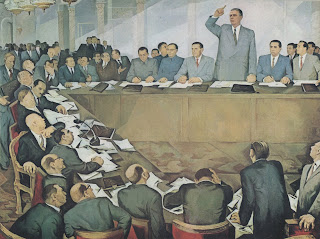Hoxhaism
Hoxhaism is a variant of anti-revisionist Marxism–Leninism and developed in 1970s due to the Sino–Albanian split. The ideology is named after Enver Hoxha, the leader of the former People's Socialist Republic of Albania. Hoxhaists usually view themselves as strictly Marxist–Leninists as opposed to being part of a distinct trend or sub-ideology. Other adherents of this tendency, like the members and supporters of the Comintern (SH), consider their theory of Stalinism–Hoxhaism as a theoretical evolution from Marxism–Leninism.[1]
Characteristics
One of the main characteristics is the defense of Joseph Stalin and organization of USSR under him. Another important characteristic is criticism of most ideologies as revisionist.
Hoxha was critical of other countries in the Eastern Bloc, mostly the post-Stalin Soviet Union, China and Yugoslavia, labeling them as social imperialists. He also criticized the invasion of Czechoslovakia by the Warsaw Pact, formally withdrawing Albania from the alliance in response. Hoxha, and his modern supporters, reject Maoism and Mao Zedong Thought as a whole.
Hoxhaists believe that every country can get to socialism and communism in different ways while still following the principles of Marxism–Leninism.
See also
References
- ↑ Wolfgang Eggers (2018–2020). "What is Stalinism–Hoxhaism?". Communist International (Stalinists–Hoxhaists). At the Internet Archive.


